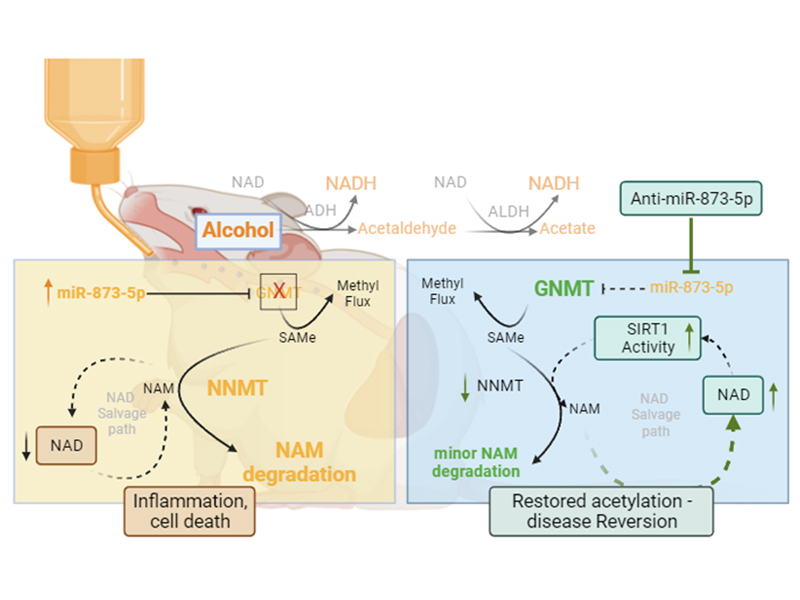
2023/10/11
New gene therapy for treating chronic alcohol-induced liver damage
Researchers from CIC bioGUNE and CIBEREHD have unveiled a promising strategy for addressing alcohol-related liver disease.
Their recent study, published in the international Journal Hepatology Reports, sheds light on the role of miR-873-5p as a potential key modulator in safeguarding the liver from the harmful effects of alcohol.
A collaborative nationwide and international study, led by the "Liver Disease" laboratory under the direction of Dr. Malu Martínez-Chantar and Dr. Naroa Goikoetxea (CIC bioGUNE – a member of BRTA - and CIBER for Liver and Digestive Diseases - CIBEREHD), has identified miR-873-5p as a key regulator in the progression of alcoholic liver disease.
Alcohol-related liver disease poses a complex puzzle to solve. Current therapeutic approaches often fall short, leaving patients vulnerable to possible relapses and worsening symptoms, even after undergoing liver transplantation. Research into the impact of alcohol on the liver has thus far revealed the crucial role played by certain gene alterations, known as "epigenetic mechanisms.
The published study, with Ruben Rodriguez as its first author, focused on a microRNA molecule (miRNA), specifically miR-873-5p, serving as a molecular switch that governs gene activity. Examination of samples from individuals with alcoholic liver disease revealed that miR-873-5p displayed notably elevated activity within their livers.
Furthermore, previous investigations conducted in the "Liver Disease" laboratory unveiled a potential connection between miR-873-5p and a protein called GNMT, which plays a protective role in the liver. In the context of alcohol-induced liver disease, it appears that miR-873-5p suppresses GNMT activity, leading to liver problems. By blocking miR-873-5p, there is the possibility that GNMT could regain its protective function.
These discoveries could have the potential to shield the liver from the detrimental effects of alcohol and could pave the way for the development of more effective treatments in the future.
Reference: Rubén Rodríguez-Agudo, Irene González-Recio, Marina Serrano-Maciá, Miren Bravo, Petar Petrov, Delia Blaya, Jose María Herranz, María Mercado-Gómez, Claudia María Rejano-Gordillo, Sofía Lachiondo-Ortega, Clàudia Gil-Pitarch, Mikel Azkargorta, Luis Alfonso Martinez-Cruz, AL Simão, Félix Elortza, César Martín, Yulia A Nevzorova, Francisco Javier Cubero, Teresa C Delgado, Josepmaria Argemi, Ramón Bataller, Kristina Schoonjans, Jesus M Banales, Rui E Castro, Pau Sancho-Bru, Matías A Avila, Josep Julve, Ramiro Jover, Jon Mabe, Jorge Simon, Naroa Goikoetxea-Usandizaga, María L Martínez-Chantar. Journal Hepatology Reports. DOI: 10.1016/j.jhepr.2023.100918
About CIC bioGUNE
The Centre for Cooperative Research in Biosciences (CIC bioGUNE), member of the Basque Research & Technology Alliance (BRTA), located in the Bizkaia Technology Park, is a biomedical research organisation conducting cutting-edge research at the interface between structural, molecular and cell biology, with a particular focus on generating knowledge on the molecular bases of disease, for use in the development of new diagnostic methods and advanced therapies.
About CIBEREHD
The Consortium of Biomedical Network Research Centres (CIBER) is a public research consortium created on the initiative of the Instituto de Salud Carlos III / Carlos III Health Institute, of the Ministry of Science and Innovation, to further research of excellence in biomedicine and health sciences conducted within the National Health System and the Science and Technology System. The scientific programme of the CIBER is organised around 13 thematic areas of research, including the area of Liver Diseases (CIBEREHD) and Diabetes and Associated Metabolic Diseases (CIBERDEM).
About BRTA
BRTA is an alliance of 4 collaborative research centres (CIC bioGUNE, CIC nanoGUNE, CIC biomaGUNE y CIC energiGUNE) and 12 technology centres (Azterlan, Azti, Ceit, Cidetec, Gaiker, Ideko, Ikerlan, Lortek, Neiker, Tecnalia, Tekniker and Vicomtech) with the main objective of developing advanced technological solutions for the Basque corporate fabric.
With the support of the Basque Government, the SPRI Group and the Provincial Councils of the three territories, the alliance seeks to promote collaboration between the research centres, strengthen the conditions to generate and transfer knowledge to companies, contributing to their competitiveness and outspreading the Basque scientific-technological capacity abroad.
BRTA has a workforce of 3,500 professionals, executes 22% of the Basque Country's R&D investment, registers an annual turnover of more than 300 million euros and generates 100 European and international patents per year.
See a large version of the first picture





